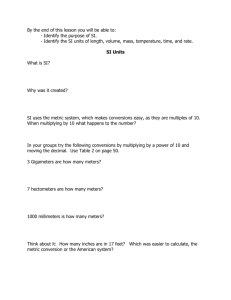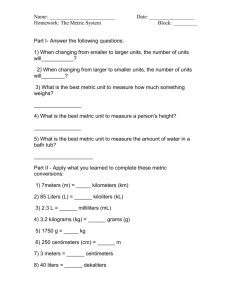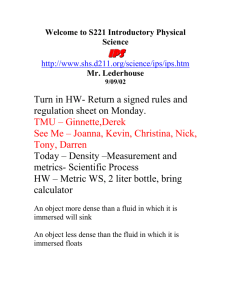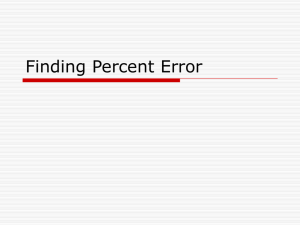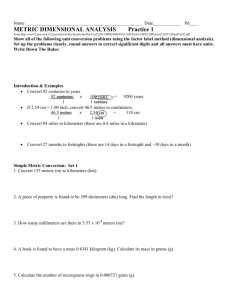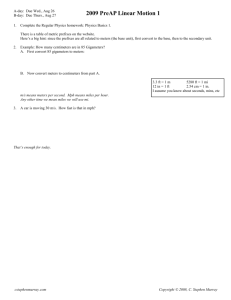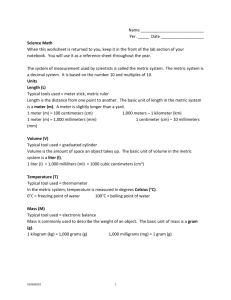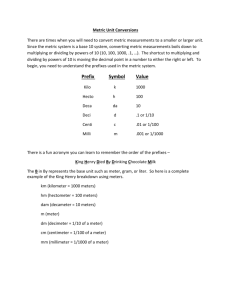RRS 1.4
advertisement
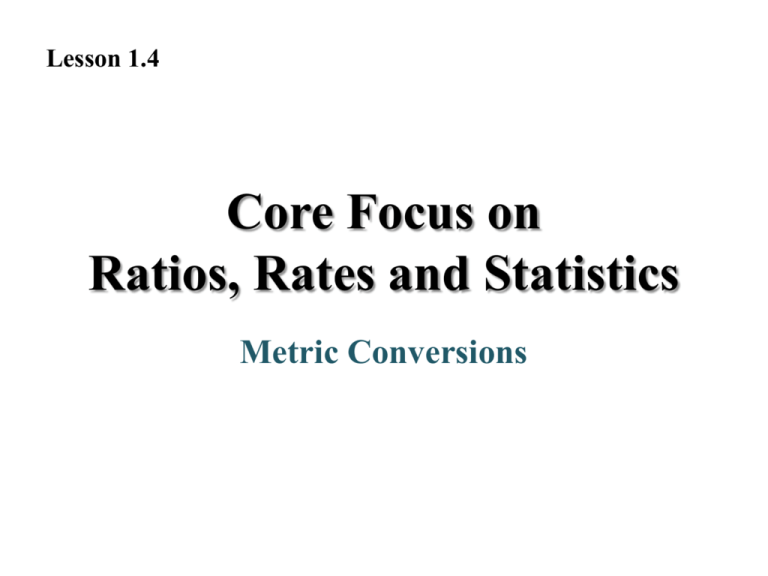
Lesson 1.4 Core Focus on Ratios, Rates and Statistics Metric Conversions Warm-Up 1. Roger has 6 green olives and 4 black olives. a) Write the ratio of Roger’s green olives to his black olives. 3 2 b) Write the ratio of Roger’s green olives to his total number of olives. 3 5 2. Complete each conversion. 1.5 feet a) 18 inches = _____ b) 2 tons = _____ 4,000 pounds Lesson 1.4 Metric Conversions Convert metric measurements. Good to Know! The metric system of measurement is used all over the world. The metric system is a base-ten, or decimal, system of measurement. Meter: defines metric units of length. Gram: defines metric units of mass. Liter: defines metric units of volume. The prefix measurement relates the unit to a meter, gram or liter. Example 1 Choose a reasonable estimate. Explain your reasoning for each choice. a. weight of paperclip: 1 gram or 1 kilogram 1 gram. It is helpful to estimate the weight of 1 gram by thinking of 1 gram as the weight of a paperclip. b. length of van: 4 kilometers or 4 meters 4 meters. A meter is a little longer than a yard which is three feet. So 4 meters is slightly longer than 12 feet. c. water in a personal water bottle: 1 milliliter or 1 liter 1 liter. One liter could be the size of a large personal water bottle. A drop of water would be a good estimate for 1 milliliter. Example 2 Using the information in the conversion table, find the number of centimeters in 60 millimeters. millimeters 10 20 30 50 60 centimeters 1 2 3 5 ? Each pair of millimeter and centimeter values show the ratio of millimeters to centimeters. Choose any ratio and write it as a fraction. Simplify the ratio, if needed. Find an equivalent ratio with 60 millimeters. There are 6 centimeters in 60 millimeters. 10 mm 1 cm Example 3 Complete the conversion. a. 2 kilometers = ________ meters Find the conversion factor. 1 kilometer = 1000 meters Multiply 2 kilometers by 1,000. 2 1000 = 2000 2 kilometers = 2,000 meters. When converting from one metric unit to another, you will multiply or divide by 10, 100, 1000, … Example 3 Continued… Complete the conversion. b. 3.9 kilogram = ________ grams Find the conversion factor. 1 kilogram = 1000 grams Multiply 3.9 kilograms by 1,000. 3.9 1000 = 3900 3.9 kilograms = 3,900 grams. Example 3 Continued… Complete the conversion. c. 4,000 meters = ________ kilometers Find the conversion factor. 1 kilometer = 1000 meters Divide 4,000 meters by 1,000. 4000 1000 = 4 4,000 meters = 4 kilometers. Example 3 Continued… Complete the conversion. d. 650 centimeters = ________ meters Find the conversion factor. 1 meter = 100 centimeters Divide 650 centimeters by 100. 650 100 = 6.5 650 centimeters = 6.5 meters. Communication Prompt How does the prefix on a metric unit help you determine the size of the metric unit? Exit Problems Complete each conversion. 1. 8 meters = ________ centimeters 800 2. 600 meters = ________ 0.6 kilometers 19,000 grams 3. 19 kilograms = ________
